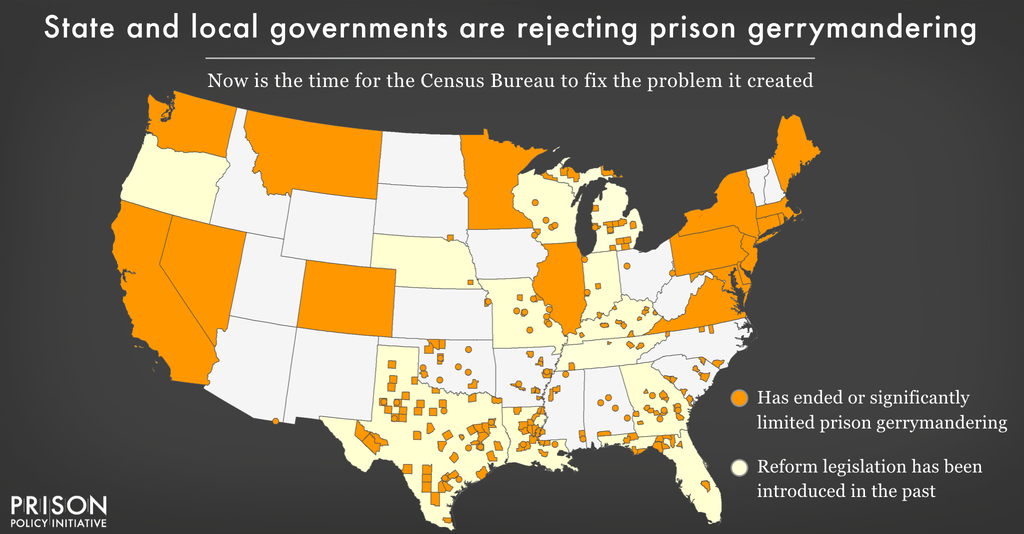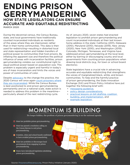“There are many ways to hijack political power. One of them is to draw state or city legislative districts around large prisons — and pretend that the inmates are legitimate constituents.”—Brent Staples
What’s new
Census Bureau's Report: States say Bureau not doing enough to end to prison gerrymandering
by Aleks Kajstura, Jan. 30
In planning for the 2030 Census redistricting data, the Bureau acknowledges calls from states to end prison gerrymandering at the source — the Census.... Read moreAdvocates urge Census Bureau to start testing reforms for 2030
by Aleks Kajstura, Nov. 12
Census Bureau should conduct small-scale tests of methods for collecting home addresses of incarcerated people to determine how best to implement a.... Read moreIf the Census Bureau truly values accuracy, it should count incarcerated people at home
by Aleks Kajstura, Oct. 30
The Census Bureau’s current method of counting people in prison and jail is prone to errors with sizable consequences. Counting incarcerated people at.... Read more
Is prison gerrymandering new to you?
Welcome! We wrote a guide to the resources on this website.
Progress towards ending prison gerrymandering
The Prison Policy Initiative launched a movement to protect our democracy from the prison industrial complex. And we’re winning; 49.6% of US residents now live in a state that has formally rejected prison gerrymandering. Here is the progress at a glance:

The national movement against prison gerrymandering began in 2001 when the founders of the Prison Policy Initiative discovered that the sheer size of the prison population was combining with an outdated Census Bureau rule to seriously distort how political decisions are made in this country. We put numbers to the problem and suggested solutions in a series of reports and sparked a national movement.
Since then, we’ve made tremendous progress towards ending prison gerrymandering:
- More than a dozen states passed legislation to end prison-based gerrymandering and count incarcerated people at home for redistricting purposes. Maryland and New York's laws changed the 2011 redistricting, and California, Colorado, Connecticut, Delaware, Nevada, New Jersey, Virginia, and Washington State's laws applied to the 2020 redistricting cycle. Meanwhile the redistricting commissions and committees in Pennsylvania, Rhode Island, and Montana counted people at home of their own initiative to avoid prison gerrymandering for the 2020 redistricting cycle. Additionally, Illinois, Montana, Maine, and Minnesota now have laws on the books and will roll out their implementation in time for 2030. New York's law was upheld by the New York Supreme Court, and Maryland's law was upheld by the Supreme Court of the United States.
- For 2010, the Census Bureau agreed to publish prison count data earlier than in the past, in order to assist states and counties with reallocating or removing incarcerated populations during the redistricting process, and for 2020 it released the data even earlier, bundling the prison count with the traditional (PL 94-171) redistricting data.
- Our research and organizing has led hundreds of county and municipal governments across the country to reject the Census Bureau’s prison counts and avoid prison-based gerrymandering.
- We led hundreds of civil rights, voting rights and criminal justice organizations and nearly 100,000 individuals to ask the Census Bureau to end prison gerrymandering before the 2020 Census.
- To support further progress, we released a guide to ending prison gerrymandering for state legislators. A joint effort with SiX, it includes lessons from our previous advocacy, detailed policy recommendations, talking points, and more to guide states introducing and passing legislation.
Don’t miss two of our resources:
Ending Prison Gerrymandering: How state legislators can ensure accurate & equitable redistricting

|
No, prison gerrymandering doesn't reallocate $1,838 per person

|
Events
- April 15-17, 2025:
Sarah Staudt, our Director of Policy and Advocacy, will be attending the MacArthur Safety and Justice Challenge Network Meeting from April 15-17 in Chicago. Drop her a line if you’d like to meet up!
Not near you?
Invite us to your city, college or organization.



